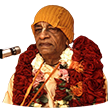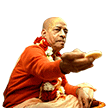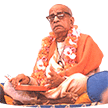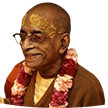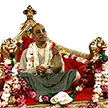Satarupa - a glorious personality: Difference between revisions
(Created page with "Category:Glorious Personalities Category:Glorious Personalities from Bhagavad Gita Category:Glorious Personalities from Srimad Bhagavatam Category:Glorious Perso...") |
No edit summary |
||
| Line 10: | Line 10: | ||
{{Personalitiesnav}} | {{Personalitiesnav}} | ||
<!----------------- BEGIN STANDARD HEADING -----------------> | <!----------------- BEGIN STANDARD HEADING -----------------> | ||
Srila Prabhupada's books, lectures, conversations and letters reveal the qualities of this glorious personality as seen in the Vaniquotes '''[[Vaniquotes:Category:Satarupa|Satarupa]]''' category. An introduction from his teachings is given below in the following | Srila Prabhupada's books, lectures, conversations and letters reveal the qualities of this glorious personality as seen in the Vaniquotes '''[[Vaniquotes:Category:Satarupa|Satarupa]]''' category. An introduction from his teachings is given below in the following 8 quotes. | ||
<!----------------- END STANDARD HEADING -----------------> | <!----------------- END STANDARD HEADING -----------------> | ||
---- | ---- | ||
== Quotes from Srila Prabhupada's teachings == | == Quotes from Srila Prabhupada's teachings == | ||
<!----------------- edit quote boxes below this line -----------------> | <!----------------- edit quote boxes below this line -----------------> | ||
{{VaniQuotebox| | {{VaniQuotebox|Empress Satarupa lovingly gave most valuable presents, suitable for the occasion, such as jewelry, clothes and household articles, in dowry to the bride (Devahuti) and bridegroom (Kardama Muni)|Empress Śatarūpā lovingly gave most valuable presents, suitable for the occasion, such as jewelry, clothes and household articles, in dowry to the bride and bridegroom. The custom of giving one's daughter in charity with a dowry is still current in India. The gifts are given according to the position of the father of the bride. Pāribarhān mahā-dhanān means the dowry which must be awarded to the bridegroom at the time of marriage. '''(Śrīmad-Bhāgavatam 3.22.23)'''}} | ||
{{VaniQuotebox| | {{VaniQuotebox|Out of them (the two bodies that came out from the body of Brahma), the one who had the male form became known as the Manu named Svayambhuva, and the woman became known as Satarupa, the queen of the great soul Manu|Out of them (the two bodies that came out from the body of Brahma), the one who had the male form became known as the Manu named Svayambhuva, and the woman became known as Satarupa, the queen of the great soul Manu. '''(Śrīmad-Bhāgavatam 3.12.54)'''}} | ||
{{VaniQuotebox| | {{VaniQuotebox|O worshipful one (Brahma), please give us (Svayambhuva Manu and Satarupa) your direction for the execution of duty within our working capacity so that we can follow it for fame in this life and progress in the next|O worshipful one, please give us your direction for the execution of duty within our working capacity so that we can follow it for fame in this life and progress in the next. Brahmā is the direct recipient of Vedic knowledge from the Personality of Godhead, and anyone discharging his entrusted duties in disciplic succession from Brahmā is sure to gain fame in this life and salvation in the next. '''(Śrīmad-Bhāgavatam 3.13.8)'''}} | ||
{{VaniQuotebox| | {{VaniQuotebox|Brahma is the original living creature in the universe, from whom were generated the Manu Svayambhuva and his wife Satarupa. From Manu, two sons and three daughters were born, and from them all the population in different planets has sprung up until now|The history of the creation of the population of the universe is given herewith. Brahmā is the original living creature in the universe, from whom were generated the Manu Svāyambhuva and his wife Śatarūpā. From Manu, two sons and three daughters were born, and from them all the population in different planets has sprung up until now. '''(Śrīmad-Bhāgavatam 3.12.57)'''}} | ||
{{VaniQuotebox| | {{VaniQuotebox|After having unmistakably known the decision of the Queen (Satarupa), as well as that of Devahuti, the Emperor (Svayambhuva Manu) most gladly gave his daughter to the sage (Kardama Muni), whose host of virtues was equaled by hers|After having unmistakably known the decision of the Queen (Satarupa), as well as that of Devahuti, the Emperor (Svayambhuva Manu) most gladly gave his daughter to the sage (Kardama Muni), whose host of virtues was equaled by hers. '''(Śrīmad-Bhāgavatam 3.22.22)'''}} | ||
{{VaniQuotebox| | {{VaniQuotebox|After asking and obtaining the great sage's (Kardama Muni's) permission to leave, the monarch (Svayambhuva Manu) mounted his chariot with his wife (Satarupa) and started for his capital, followed by his retinue|After asking and obtaining the great sage's permission to leave, the monarch mounted his chariot with his wife and started for his capital, followed by his retinue. Along the way he saw the prosperity of the tranquil seers' beautiful hermitages on both the charming banks of the Sarasvatī, the river so agreeable to saintly persons. '''(Śrīmad-Bhāgavatam 3.22.26-27)'''}} | ||
{{VaniQuotebox| | {{VaniQuotebox|The potencies of the Lord are also known to the all-powerful Siva, the great king of the atheist family, namely Prahlada Maharaja, Svayambhuva Manu, his wife Satarupa, his sons and daughters|Although the potencies of the Lord are unknowable and immeasurable, still, because we are all surrendered souls, we know how He acts through yogamāyā potencies. And, similarly, the potencies of the Lord are also known to the all-powerful Śiva, the great king of the atheist family, namely Prahlāda Mahārāja, Svāyambhuva Manu, his wife Śatarūpā, his sons and daughters. '''(Śrīmad-Bhāgavatam 2.7.43-45)'''}} | ||
{{VaniQuotebox| | {{VaniQuotebox|Out of them (the two forms generated from Brahma's body), the one who had the male form became known as the Manu named Svayambhuva, and the woman became known as Satarupa, the queen of the great soul Manu|Out of them (the two forms generated from Brahma's body), the one who had the male form became known as the Manu named Svayambhuva, and the woman became known as Satarupa, the queen of the great soul Manu. '''(Śrīmad-Bhāgavatam 3.12.56)'''}} | ||
<!----------------- edit quote boxes above this line -----------------> | <!----------------- edit quote boxes above this line -----------------> | ||
Latest revision as of 11:15, 23 December 2016
INTRODUCTION TEXT TO BE WRITTEN
Srila Prabhupada's books, lectures, conversations and letters reveal the qualities of this glorious personality as seen in the Vaniquotes Satarupa category. An introduction from his teachings is given below in the following 8 quotes.
Quotes from Srila Prabhupada's teachings
Satarupa - explore more within this category.
Vanipedia has now over 215 introductory articles compiled from Srila Prabhupada's teachings under the series titled Glorious Personalities. All these articles can be seen in the Table of Content on the right side of this article and also here in this Umbrella Category. Browse through them to relish the breadth and depth of Srila Prabhupada's teachings - There is an attractive personality for everyone.
